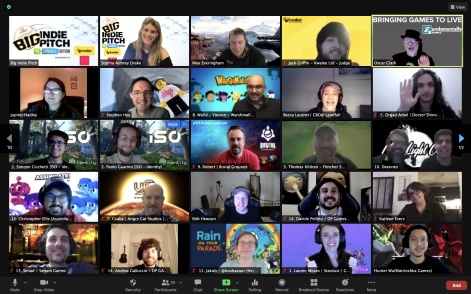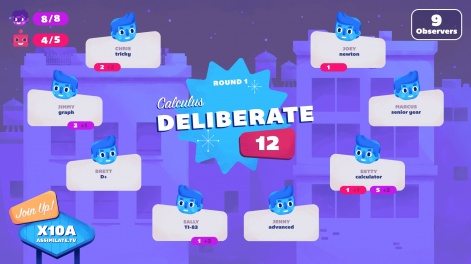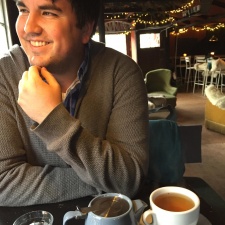The Big Indie Pitch is a regular event run by the makers of Pocket Gamer and PC Games Insider. It sees indie developers engage in a speed-dating-styled pitching competition for fame and those sweet, sweet promotional packages.
The event gives indies five minutes to pitch their games to a panel of press, publishers and industry pundits. The judges then pick three winners and everybody gets valuable feedback.
The indie view
The Big Indie Pitch is getting bigger and bigger as we bring it to events all across the world. To give you an idea of what the event is like, who attends the events and the games on show, we've sat down with a number of past PC Indie Pitch contestants to offer their views.
Today, we're speaking to Friendship is Fun Studios' Christopher Ellis, who submitted Assimilate! (A Party Game) to The Digital Big Indie Pitch (PC+Console Edition) #8 and walked away with the prize for third place.

Sophia Aubrey Drake: Tell us a little about yourself and your indie studio - who is on the team, and what are their inspirations?
Christopher Ellis: Hello, I’m Chris from Friendship is Fun Studios, an indie studio from Dallas, TX. There are three of us on the team, myself (the game designer), Brett (the artist), and Marcus (the programmer). We were inspired to make this game because of our love for social deduction games, our addiction to party games, and, quite frankly, our frustration that there weren’t more social deduction party games available.
Jackbox was definitely a huge inspiration, as they certainly are the “Godfather” of party games, setting the bar very high for creating quality, fun party games year after year. We were also inspired by some of our favourite board games like Codenames, Chameleon, and Secret Hitler, blending the “Word game” genre with the “Social Deduction” genre to create something really fun and unique.
Tell us about Assimilate! (A Party Game) that you pitched at the competition.
Assimilate is a social deduction party game set in the 1950s about a cleverly disguised robot sneaking into a local, “Humans Only” sock hop. 5-10 players can use their phones as controllers and play locally or online in three rounds of finger-pointing fun.
We had a Twitch streamer recently describe our game as, “Codenames meets Among Us, wrapped in Jackbox” which was really flattering since we love all those games so, so much.
What do you think are the most unique and interesting aspects of Assimilate! (A Party Game) that gamers may never have seen before.
You can count on one hand (maybe two) the number of social deduction party games on the market. It’s a very niche space recently popularized by the explosive growth of Among Us. We knew that Among Us did us a huge favour by showing the world how fun and exciting the social deduction genre could be, so we wanted to capture all that excitement while packaging it in a beautiful, cute 1950s aesthetic.
The ‘deliberation’ aspect of our game is particularly unique because it really allows everyone to accuse other players from their phones without the need to vocalize. This makes it easier to play our game online over Twitch streams, but more importantly, it also helps make our game more accessible to everyone, not just the loudest, most outgoing personalities in the room.
Assimilate! (A Party Game) is a retro-themed party game. What made you choose this genre, and what do you think you bring to it that may not have been seen before?
When we first came up with the concept for Assimilate, we knew we liked the concept of a robot trying to blend in with a group of humans. We liked that idea of a robot attempting to disguise themselves in a cute and adorable way. The early concepts, however, had more of a Terminator/Judgement Day-vibe but we knew that concept didn’t mesh well with our aspiration to make a ‘fun, cute’ game that’s fun for kids and adults alike.
Mind you, this was also taking place in the midst of quarantine, where everyone was (understandably) bitter, scared, upset, and tired, so at that point, we were even more determined to create a game that felt more fun and inviting vs. cold and scary.
So we switched directions and settled on a 1950s-style game with sock hops, jukeboxes, and lovable, nostalgic, old-timey music. We really appreciated that the 1950s was a relatively underutilized theme which inherently makes it easier for us to be unique and stand out as well.
How did you come to choose the platforms that you would develop Assimilate! (A Party Game) for?
Since this was our first game we knew we wanted to start with Steam since it was a very accessible platform with a massive audience. We also decided to make the game using Unity to better prepare ourselves for porting the game to other consoles/platforms when the time comes as well.
Looking at the studio a little more now. How hard is it to survive as an Indie developer?
Nowadays there are so many free tools, limitless tutorials, and helpful forums for first-time game devs that it definitely seems like the best time to make a game. With that being said, because the barrier to creating a game is so low, that also means there are so many games being made so making a game that stands out actually becomes increasingly difficult.
For that reason, it’s hard to say ‘how hard’ it is to survive. On one hand, we were able to make a party game over 18 months on nights and weekends with limited upfront costs, so you could argue it’s “easier than ever” for indie developers to create a game. But on the other, there are so many games out there competing for the audience’s attention that trying to sell that game may actually be harder than ever. So long story short, I’ll probably have a better answer for you in a few months after our game has been launched and we see how much of our initial investment we were able to recoup.
Are there any tips and advice you would give to independent developers out there who are just starting out?
For me, I think one of the biggest learnings came from releasing our game to the public WAY before we felt comfortable doing so. Sure, our game was in a ‘playable’ state meaning you could technically finish the game and there was still some semblance of the game’s overall backbone, but it was missing several features, aesthetics, and sound effects we knew we ultimately needed to include in our final version. Because the game was in such a barebones state, I was so terrified to publish a Steam page, let alone a playable version of the game.
In fact, I remember really wanting to delay our Alpha playtest the night before we were supposed to publish it. I remember feeling like we had too much left to do before we could share it. I remember fearing that nobody would play the game in such an unfinished state and that we would just create a ‘bad first impression’ for anyone who does. I was wrong. Thankfully, Marcus and Brett were convinced that we should stick to our original plan and launch the alpha playtest and I’m so, so glad we did.
Releasing the game to the public resulted in a few things:
- We got a ton of great feedback, early on. We figured out what parts people liked, what parts people didn’t like, and we got to make these changes early rather than wasting time and energy on a version of the game people wouldn’t have liked as much.
- We were introduced to our early adopters. These early fans of the game were instrumental in helping us fine-tune the game, check back for confirmation that our changes worked, and ultimately act as our evangelists for the game as they shared it with their friends and followers.
- Lastly, releasing the game gave us a huge confidence boost. It was exciting. Seeing people play our game on Twitch for the first time and witnessing strangers enjoy the game dramatically improved our motivation to continue making the game. It was invigorating.
There’s a quote from Reid Hoffman, the founder of LinkedIn, in which he states, “If you are not embarrassed by the first version of your product, you've launched too late.” This rang in my head as we decided to follow that advice, and it turns out it was one of the best decisions we made throughout this whole process. So the moral of the story is this; be sure to start playtests for your game as early as you can.

How did you find your experience pitching as a part of the Big Indie Pitch?
Honestly, it was one of the most exciting aspects of this game development process, no joke. Getting to show off (i.e. brag) about the game we’re so proud of making in front of a room full of seasoned game veterans who not only patiently listened to our pitch but complimented us on the game we were making was such a thrill. The whole experience was such a blast.
What do you feel you have gained from the experience, and what do you still hope to gain?
We competed at the Big Indie Pitch in February 2021, at which point we were almost a full year into development. You would think a full year into the process we would have already mastered our ‘elevator pitch’ and could immediately convey to you what made our game unique, but that wasn’t exactly the case.
Sure, we had conducted several playtests and talked about our game extensively by that point, but the act of creating an official pitch with a strict time limit really forced us to scrape away all the ‘fluff’ and make every word count. That process not only helped us realize the most efficient, effective way to describe our game to the public going forward, but it also helped us really understand what aspects of the game were the most unique, and therefore, marketable. It was an extremely valuable experience that I would absolutely recommend to anyone making a game of their own.
What are your hopes for this game in the future, and do you have any plans for any future projects?
We are officially launching our game on Steam this week (on August 26th to be exact) and couldn’t be more excited. We have already been blown away by the feedback we have been receiving from streamers playing our closed Beta and cannot wait to share this game with the world. We also have a pretty detailed roadmap for our game with new features, and other updates like localizing it for different languages, porting it to new consoles, etc. so this will definitely keep us busy for a good bit.
With that being said, we also have some really fun, new ideas for our next game which will continue to showcase some unique party game elements that have never been seen before. So if you’re a fan of the social deduction/party game genre, you’ll definitely want to follow us.
Want to show off your exciting new game? We host Big Indie Pitch events throughout the year, so be sure to keep an eye out on our events page for an event near you, or even our new Digital pitches.
All our upcoming pitches including how to enter can be found over on our upcoming events page on BigIndiePitch.com.
Get the latest news, interviews and in-depth analysis on Twitter, Facebook, and our daily newsletter.












